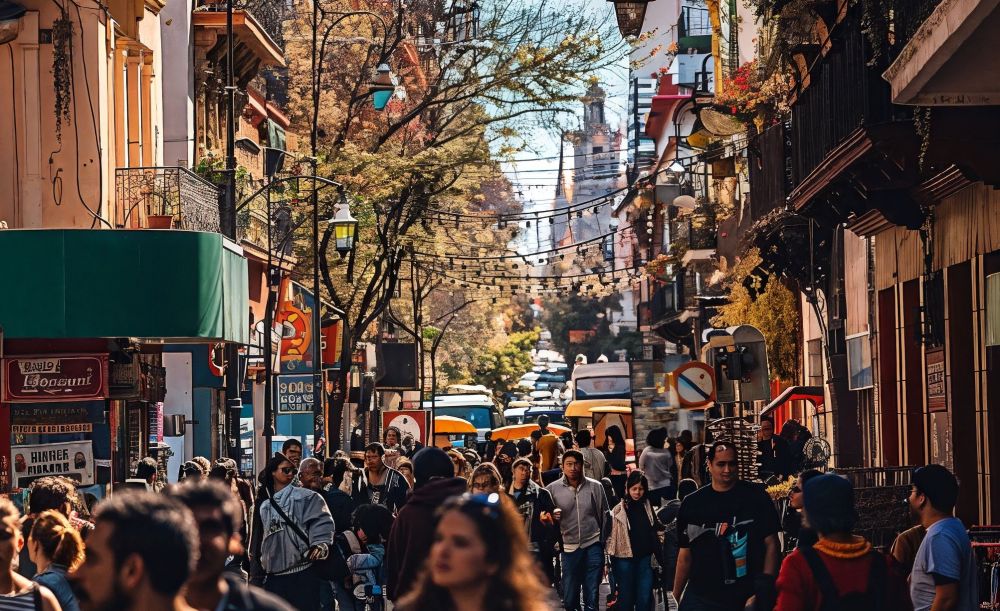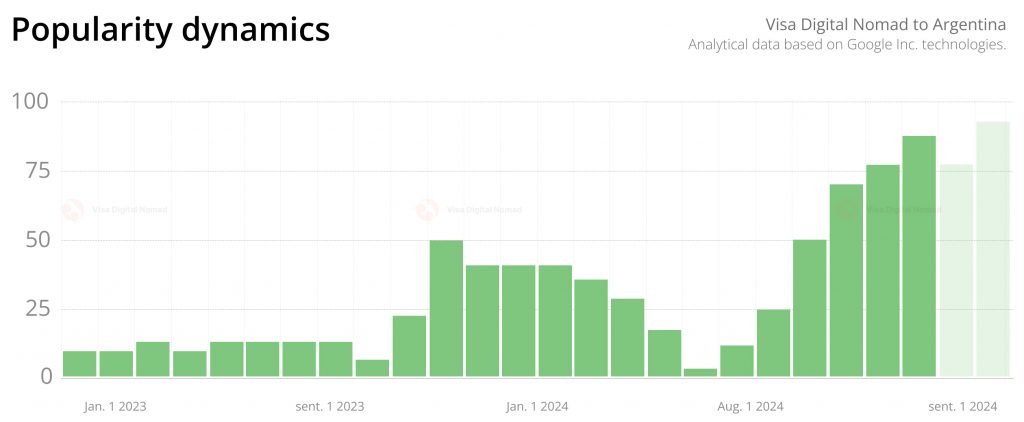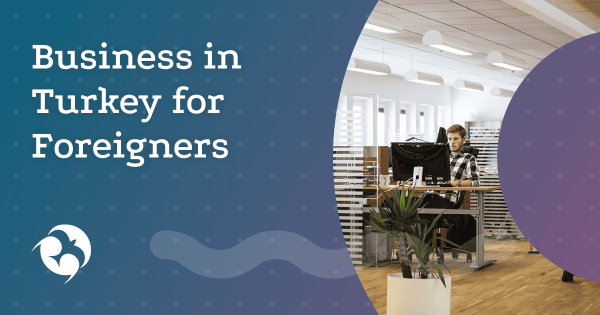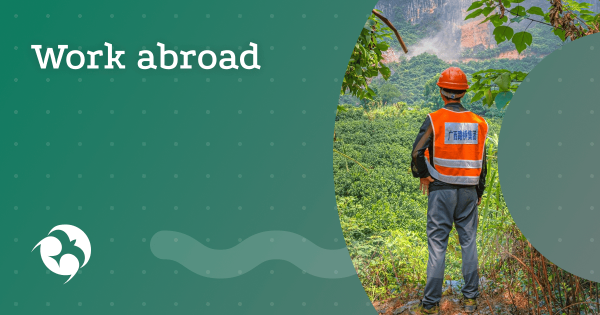In 2022, the authorities in Argentina legalized the possibility for foreign freelancers to work within the South American country. To live and work legally, they need to apply for a “nómadas digitales” transient residency. This document provides its holder with a number of advantages:
- Discounted accommodation in hotels;
- Discounts on airfares;
- Discounts when paying for services in coworking spaces;
- Access to the national healthcare system.
Buenos Aires ranks among the top 5 cities in the world for working online. Every month, approximately 2,300 holders of the digital nomad visa arrive at this location.
Applicants for this type of transient residency are not required to prove their income level with specific figures; the main requirement is that it must be regular.
The Argentine Embassy in Moscow (located at 72 Bolshaya Ordynka Street) issues the entry permit to the South American country for freelancers.
Specifics of the Freelance Visa
The “nómadas digitales” transient residency is exclusively aimed at foreigners working remotely (or those involved in developing startups). The document is issued to applicants who do not require a tourist visa to enter the country. The digital nomad visa is valid for 180 days with the possibility of extending it once for the same period. Under these conditions, remote workers cannot expect to obtain permanent residency in Argentina. To acquire citizenship through naturalization, one must live in the country with legal residency for at least 2 years. A freelancer’s temporary residency is granted for only 360 days.
Freelancers need to be aware that the freelance visa in Argentina is classified as a non-immigrant residency. This type of document does not allow a digital nomad to live and work in the South American country along with family members. For Russians preferring to work remotely, these are not the only downsides.
Formally, the holder of a digital nomad visa cannot expect to receive a DNI (an identity card). Without this card, there may be difficulties in opening an account in a local bank and accessing the national electronic payment system (MercadoPago). For the self-employed without a DNI, finding affordable housing in Argentina becomes more challenging. Self-employed individuals are not allowed to have dependents from among their relatives.
Foreigners may enter Argentina as tourists and then apply for the “nómadas digitales” transient residency.
Taxes for Freelancers
Holders of the digital nomad visa are not taxed on income earned outside Argentina. Additionally, self-employed foreigners do not pay fiscal fees as prescribed by national legislation.
Tax table for digital nomads, freelancers, self-employed and sole proprietors
| Tax name | The amount of tax | Note |
| Income tax (for digital nomads) | 0% | The exemption is valid if you have a Digital Nomad visa and income from outside Argentina. Applies if the stay is less than 183 days. For residency (from 12 months), the tax is levied on global income on a progressive scale. |
| Income tax (for residents) | 5-35% (progressive scale) | For tax residents (residence for more than 12 months). The tax applies to income from Argentine sources. – Up to 1,200,000 ARS (≈$1,200) – 5%; – 1 200 001–2 400 000 ARS – 9%; – Over 2,400,000 ARS – up to 35%. |
| Value added tax (VAT) | 21% (standard) 10.5% (preferential) |
Mandatory for sole proprietors and companies with a turnover of more than 1,000,000 ARS/year. Does not apply to the export of services (freelance for foreign clients). |
| Social contributions | 17-21% (employer) 14% (employee) |
For officially registered employees. The self-employed (monotributistas) pay fixed contributions depending on the category (from 1,500 to 8,000 ARS/month). |
| Tax on export of services | 0% | Income from services to foreign clients is considered an export and is not subject to VAT. Registration with AFIP and confirmation of the contract are required to apply for the benefit. |
| Single tax for small businesses (Monotributo) | 1,500-8,000 ARS/month | For the self-employed with an annual income of 4,800,000 ARS. Includes taxes and social contributions. The category depends on the type of activity and turnover. |
Cost of the Visa
The fee for processing the nomad visa to Argentina is 200 euros (80 euros for the consular fee and 120 euros for the migration fee).
The costs for applicants arranging the “nómadas digitales” transient residency after entering the South American country as tourists will amount to 30,000 pesos (15,000 pesos for foreigners arriving from Uruguay, Paraguay, Brazil, and Venezuela).
For your convenience, we’ve presented these expenses in the form of a table below.
| Fees, duties and other expenses for obtaining a visa | Cost |
| Consular fee | 120 € |
| Migration fee | 80 € |
| Visa processing («nómadas digitales») | about 1400 € |
| Visa extension in a year | about 190 € |
| Total | 1790 € |
Required Documents
To obtain the “nómadas digitales” transient residency, a self-employed individual must provide:
- An application form;
- Civil passport;
- Resume (to confirm professional skills and work experience);
- A work agreement with an employer registered outside the South American country (confirmation of remote work);
- A 3.5 x 4.5 cm color photo (1 copy);
- Rental agreement;
- Receipt for the fee payment;
- Statements confirming income from employers (bank account statement).
Documents must be submitted in digital format (previously translated into Spanish with a special note by a professional translator).

- We will answer all your questions
- We will help you choose the best option
- We will guide you through every step or do everything for you
For visa extension at the migration office, additional documents required include: a certificate of no criminal record (for the period of stay in Argentina), documents proving income from freelance activities, and evidence of continuous residence in the South American country for at least 3 months since the issuance of the residency.
Recent Changes in Visa Issues with Argentina
As Argentina offers a competitive package of services for remote workers, freelancers from around the world come to live and work in the country.
According to public data from Google Trends there is a stable demand for temporary accommodation , the number of searches related to becoming a “digital nomad” increased by 50% in 2024.
Frequently Asked Questions
Yes, in Argentina there is a procedure for changing the status from a tourist to a digital nomad. To change the status, you need to collect all the necessary documents and meet the requirements of the program.
Usually, a digital nomad visa in Argentina is valid for up to a year. This period allows you to work remotely, explore the country and enjoy its culture. If necessary and certain requirements are met, it is possible to extend the visa for another year.
No, the digital nomad visa in Argentina is classified as nonimmigrant and does not apply to family members. Each family member will need to look for other grounds for legalization in the country. Argentine legislation does not provide for the sponsorship of family members by the main applicant applying for a short-term residence permit on a digital nomad visa.
Да, наличие справки о несудимости является обязательным требованием. Этот документ подтверждает, что у человека нет судимости в стране постоянного проживания или любой другой стране, где претендент проживал в течение последних пяти лет. Справку нужно будет получить в соответствующих органах и перевести на испанский язык.
Yes, apostilling the contract with the employer is necessary. This process confirms the authenticity of the document and its recognition in Argentina. Apostillation is carried out in the country where the contract was concluded, usually through government agencies or notary services.
All key documents must be apostilled. This also applies to a birth certificate and a criminal record certificate. It is important to remember that the apostille is always placed only in the country of issue of the document. It is impossible to apostille Russian documents in Argentina, even through the consulate.
Yes, all documents for a digital nomad visa must be translated into Spanish. There are two ways to make a transfer. Before entering Argentina through official translators in Russia. While already in the country, using the services of local translators. The translations must be official and certified accordingly.
To confirm the status of a remote employee, you must provide an employment contract with a foreign company and a certificate from your place of work. For freelancers, contracts with clients or receipts for payment for services, confirmation of regular cash receipts (bank statements).
Medical insurance must be valid in Argentina, cover basic medical services, and be valid for the entire period of stay in the country. Insurance may also be required when boarding a flight, as some airlines check its availability.
There are two ways to apply for a visa. There are many more reasons to move to Argentina.
- Before entry through the consulate (cost: $120 migration fee + $80 consular fee).
- Already being in the country on the basis of a visa-free regime (cost: 30,000 pesos)
When applying for a visa in Argentina, a temporary “precaria” document is issued, which allows you to legally stay in the country after the end of the 90-day visa-free period and freely leave and enter back.
The standard time for reviewing documents varies from 10 to 45 days, depending on the workload of migration services and the completeness of the data provided. When submitting through the consulate, the deadline may increase due to the need for diplomatic transfer of documents. It is important to keep in mind that during periods of high demand (for example, during the tourist season), the processing of applications slows down.
The initial validity period of the visa is 180 days (6 months). At the same time, the applicant has the right to extend the status for another 180 days, which allows him to legally stay in the country for up to 1 year. The total maximum period of continuous stay under the program is limited to 3 years, subject to compliance with all requirements.
It is recommended to start the process 2-3 months before the scheduled departure. This allows you to take into account the timing of apostillation of documents (from 1 to 4 weeks, depending on the country), their translation into Spanish (5-10 business days), as well as possible delays in arranging interviews at the consulate. For persons who are already in the country on the basis of a visa-free regime, documents must be submitted no later than 30 days before the expiration of the 90-day period.
The passport must be valid for at least 6 months at the time of application. A certificate of non-criminal record is considered valid for 90 days from the date of issue. Bank statements should cover the last 3-6 months. Medical insurance must cover the entire period of the requested stay with a margin of 15 days.
The digital nomad visa is activated from the moment of the first border crossing. The period between the approval of the application and the first entry should not exceed 90 days. Otherwise, the permit is revoked. After activation, the 180-day period starts from the date of entry indicated on the migration card.
An extension is possible 30 days before the expiration of the initial 180-day period. The application is submitted to the Dirección Nacional de Migraciones offices with an updated package of documents, including fresh bank statements and proof of absence of tax obligations in Argentina. The decision on the extension is made within 15-20 business days.
When submitting documents from Argentina, the applicant receives a temporary document (precaria) valid for 90 days. During this period, the migration service must review the application. If approved, precaria is replaced with a full-fledged visa, which is valid from the date of initial entry.
If the visa is refused, a re-application is possible after 6 months. This period allows you to eliminate the reasons for refusal, which are most often associated with insufficient proof of income or errors in paperwork. In exceptional cases (for example, when providing new substantial evidence), the period may be reduced to 3 months by decision of the consulate.
The digital nomad visa does not provide for the inclusion of family members. Relatives must apply for separate visas (for example, tourist visas) with a maximum stay of 90 days, which can be extended through local migration offices every 3 months. For long-term stays, it is recommended to consider other types of resident visas.
After the expiration of the visa or the refusal to extend it, the applicant must leave Argentina within 10 working days. Violation of this rule entails a fine of 30-50% of the cost of the visa and a possible ban on re-entry for up to 2 years. In case of force majeure (for example, medical indications), you can request a 30-day extension through the migration service.
The total cost varies from $200 to $400, depending on the way the documents are submitted. When applying through a consulate outside of Argentina, a $120 migration fee and $80 consular fee are charged. For those who apply while already in the country, the cost is 30,000 pesos (about $240).
- Apostillation of documents: $50-150 for a criminal record certificate and a birth certificate.
- Official transfer: $30-80 per document.
- Courier services: $50-100 for forwarding documents to the consulate.
- Insurance: minimum $150 for six months.
- Legal services: from $300 for full support.
- Initial payment: 50% upon application.
- Final payment: After visa approval.
- Extension: One-time payment of 4,000 pesos.
- Payment is made via bank transfers or in cash at official Migraciones points.
No. Consular and migration fees are non-refundable, even if the applicant has been refused. The exceptions are cases of technical errors during payment.
Visa holders are exempt from paying taxes in Argentina, provided that the income comes from abroad, there is no employment in local companies, and the stay does not exceed 360 days.
No, a digital nomad visa in Argentina does not provide a direct path to citizenship. It is classified as a temporary (nonimmigrant) visa that allows you to stay in the country for up to 1 year and does not give you the right to permanent residence or citizenship.












